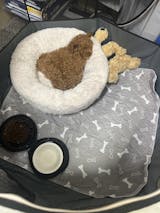How Long Can Your Dogs Hold Their Pee?
It's a lovely experience to be a dog parent. It doesn't always feel the same, though. Training a dog can be stressful. If it’s about potty training then it becomes more complicated. So, Is there a simpler method to do it correctly? We'll talk about How Long Can Dogs Hold Their Pee in this blog so that you can learn their characteristics & cherish your time with your beloved pet.
Why Does Your Puppy Hold Their Pee?
How long can your dogs hold their pee? A general rule of thumb is that your dog can retain her bladder for one hour every month she is aged. Puppies under the age of 16 weeks are unable to manage their bladders. However, we occasionally notice puppies holding their urine for far too long. Why is that? There can be three possibilities.
- Urinary stones and a urinary tract infection are two major causes of your dog's inability to urinate frequently. If the infection is not treated, it can progress to more serious issues like renal failure or a ruptured bladder.
- Your dog may not urinate as frequently as they should or need to if they are scared or nervous. Also, a new environment can cause your dog to have difficulty urinating, especially if you have recently relocated.
- If your dog isn't urinating as frequently as usual, especially if it's been more than 12 hours since they last did so, dehydration could be the cause. To prevent dehydration, make sure your dog has access to clean water throughout the house.

Does Environment Cause Any Issue for A Puppy to Hold Their Pee?
In this circumstance, the environment plays a key role. Any circumstance that makes your dog uneasy can cause your puppy to keep his urine. For example, your dog may not urinate as frequently as they should or need to if agitated or anxious. A new environment, especially if you have recently moved into a new place, can cause your dog to have difficulty urinating. If there are other dogs in the vicinity of where your dog usually urinates, this may cause anxiety.
How Pee/Potty Training Can Affect Your Puppy’s Bathroom Routine
There's no denying that puppies are adorable, but they're also a lot of work. Even for pee and poop, you must train him. But how long can a dog go without peeing? It's all up to you and your puppy. A good bathroom regimen and training, on the other hand, can be quite beneficial. On the other hand, it might be a disaster if you train him to take a leak on unnecessery times.

Please pay attention to your dog's body language to figure out when they need to go potty. Then, create a routine based on it. It's probably at least every two hours—and right after they wake up, while they're playing, and after they eat or drink. Success can be achieved with good training.
Puppy’s Bathroom Needs
Depending on how long dogs can hold their pee, you can decide whether you need to buy any products or not. Dog-friendly items can assist you in reducing the likelihood of an accident in the home. Pee pads, diapers, and other personal hygiene products are examples. In addition, Dry Paws offers high-quality products that are gentle on your dog's fur and skin. The Dry Paws products that will make life easier for your dog are listed below.
Premium Reusable Accident-Proof Puppy Pads
Puppy Pads from DryPaws have a unique three-layer design that eliminates leaking, odour, and tracking of doggy waste. It's robust, machine-washable, and ready to take on whatever your pet can throw at it.
Oversized Reusable Dog Accident-Proof Puppy Pad
Dry Paws, Because it's soft and comfortable, your dog will immediately use it! Fluids are absorbed faster and more effectively than single-use pads. It's also perfect for transporting crates and carriers, whelping, incontinence, sick/diabetic dogs or cats, and keeping pet fur and grime off furniture and rugs.
Reusable & Washable Doggie Diapers
Our reusable and washable Dry Paws pet diapers are developed to keep mishaps from becoming messes. So whether your pet is in season or your new puppy isn't yet housebroken, Dry Paws has got you covered. However, we recommend that you only use it when absolutely essential. It could jeopardise your puppy's training.
Other Factors that Causes Your Puppy to Hold Their Pee
If your dog is having accidents in the house regularly, you should think about why. The first step is to contact your veterinarian to rule out any medical issues. If your dog is in good health, the issue could be one of behaviour.
Excitement
Excitement peeing is typical in puppies and even young adult dogs. Puppy piddles is a typical term for this. Is your dog peeing as soon as you step through the door? It isn't always the case that he can't take it anymore. Instead, he's likely overcome with joy at the prospect of seeing you.
Ignore your dog until he is relaxed enough to be rewarded with attention to untrain this behaviour. It will take time, patience, and persistence to do this. Many younger dogs, fortunately, outgrow this tendency on their own.
Marking
Another reason your dog might be having accidents in the house is territory marking. Territory marking psychology is anchored in their inherent inclinations. It's a game of strategy. When a new creature or person is introduced into the home, your dog's position in the hierarchy is endangered, and this habit develops.

Consult your veterinarian about whether spaying or neutering is the best solution for your pet.
The majority of fixed dogs that mark do so because they are anxious. Stress, worry, and terror can be relieved by keeping your pet cognitively and physically occupied.
Submissive
Submissive urination is fear or anxiety-related behaviour in which a dog pees. It is more prevalent in young puppies who are learning to trust people, but it can also happen in mature dogs.
If your dog pees at times listed below, you're dealing with submissive urination:
- Voices that are loud or aggressive
- When someone comes up to them, they are frightened.
- When they're greeted
- When there's a commotion, such as a loud debate or the sound of sirens
Maintain as much consistency in their schedule and environment as possible, and stand up for them in situations that could trigger the behaviour. Gradually introduce them to new people and settings.
Don't criticise or punish them for submissive urinating. This is only going to worsen the problem.
Attention Seeking
When your dog pees for attention, it's more of an acquired behaviour – the dog understands that by doing so, he'll almost certainly get your attention, whether it's positive or negative. The initial step should be to schedule an appointment with your pet's veterinarian. This is done to rule out any potential medical issues. In addition, the doctor will be able to advise you on the best course of action. A dog who pees primarily for attention will almost certainly require behavioural counselling and, in some cases, obedience training.
What if Your Puppy Holds His Pee for too Long?
When I was a dog parent, I worked full-time. So I had to leave him for at least eight hours, including travel time. Since he wasn't trained, my first concern was his potty schedule. How long can dogs hold their pee? Is it even safe? Let's discuss what I've discovered.

It is, however, unhealthy for dogs to go for long periods without peeing. Toxins can back up, bladder muscles can atrophy, and other problems can result from holding urine in. When you force your dog to retain his urine for an extended amount of time, veterinarians have observed that various health complications might arise, including:
- Kidney issues
- Urinary Tract Infections (UTIs)
- Bladder stones
- Incontinence
- Bladder cancer
Furthermore, dogs may become uneasy when they are left alone for long periods without access to a potty location. Other symptoms include frequent accidents, excessive genital licking, increased thirst, difficulty urinating, blood in the urine, etc. A healthy dog should be let out to urinate every four to six hours on average.
Does Holding Pee Cause Puppies to Pee in Sleep?
There is no direct link between puppy holding pee and peeing in sleep. Incontinence is the most frequent cause of dogs peeing while sleeping. This issue can be caused by various factors, including a urinary tract infection or bladder stones. Although age can damage a dog's ability to control his bladder, this is not always the case, as some younger canines also have this problem. It's always advisable to consult your veterinarian first.
Importance of Your Puppy's Bathroom Routine
Dog bathroom can be a real problem for a parent if they are not trained. A puppy's bladder control usually improves by one hour every month of age. If your puppy is two months old, they will be able to carry it for roughly two hours. They won't be able to go longer than this between restroom stops without having an accident. However, retaining urine for prolonged periods can increase the risk of diseases such as UTI, bladder cancer, and bladder stones. Any of these concerns can be resolved with a proper, dog-friendly bathroom schedule. How?
If you stick to a regimen, the chances of an accident are almost non-existent. Because she won't have to keep it for as long, your dog won't be bothered. It will make things much easier for your dog (and you!). Make sure not to scold her even if she has an accident despite having a routine.
Ways to Train Your Puppy with a Proper Bathroom Routine
A puppy needs to go to the bathroom multiple times a day. As a result, devise a regimen that is appropriate for your dog.
First, choose where you want them to pee. If you are away from home for an extended time, train them to live in the house. Alternatively, it is the greatest option if you or another family member can take them outside now and then to train them.
Second, if you plan to house train your puppy, we recommend purchasing a puppy pad. Dry Paws pet pads are machine washable and reusable. It can withstand 200 washes. It can be used continuously for up to 48 hours.

Third, whether indoors or outside, choose a permanent location. Place the pad in that specific location throughout the house. Allow them to sniff the area or pad. Don't stress them; instead, be gentle.
Fourth, try to read their body language when they have to go to the bathroom. Act following this.
Fifth, use a fixed command. So they know when it's time to go potty. Don't mix up your words. It may cause them to become perplexed.
Last but not the least, even if you're training them, there's always the possibility of an accident. Do not chastise them. It has the potential to scare them. When kids do things correctly, reward them.
















